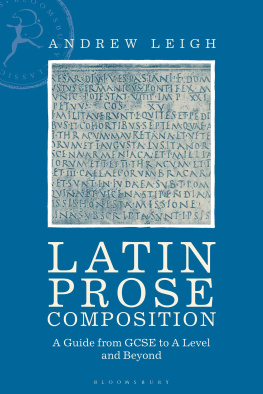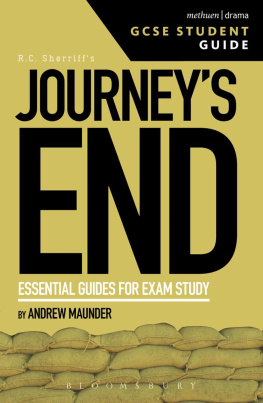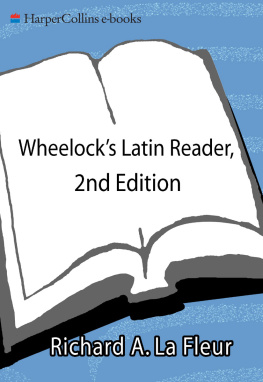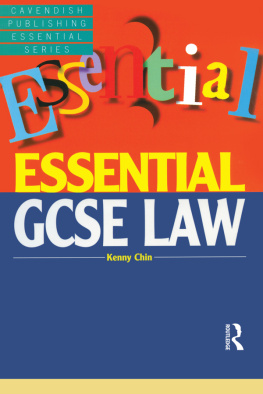
Latin Prose
Composition
ALSO AVAILABLE FROM BLOOMSBURY
Essential GCSE Latin, John Taylor
Latin to GCSE: Part 1, Henry Cullen and John Taylor
Latin to GCSE: Part 2, Henry Cullen and John Taylor
Latin Beyond GCSE, John Taylor
Ovid Unseens: Practice Passages for Latin Verse Translation and Comprehension, Matthew Owen
Prose Unseens for A-Level Latin: A Guide through Roman History, Matthew Owen


Contents

Preface
The structure of the book is, I hope, self-explanatory. Those who are preparing for AS may be happy to tackle just the sentences. The continuous passages will be useful for those aiming at A Level or Pre-U. I hope that those studying Latin at university will also find useful material here.
The vocabulary in the sentences is confined to the OCR AS List. Up to Chapter 31 if a word used in a continuous passage is not on the AS List, it is glossed.
A preface traditionally affords the writer an opportunity for some personal remarks. I have been privileged to try to teach Latin to the boys of Winchester College for over thirty years now. I hope that some of them sometimes found some of the things we did interesting and perhaps even fun. I am deeply grateful for the support of my kind colleagues in the Classics Department, and I especially thank Stephen Anderson for being so scarily good at Latin.
When I first came to Winchester, I succeeded Johnny Stow. His understanding of Latin has been a constant inspiration to me, and if it is possible to dedicate a text book, I dedicate this to his memory.
Verbs
The ending of the verb gives the person and the tense.
The present tense describes what is happening/happens.
The imperfect tense describes what was happening/used to happen.
The perfect tense describes what happened/has happened.
3rd person singular: he/she/it
| present | amat | he/she/it loves; is loving |
| imperfect | amabat | he/she/it was loving; used to love |
| perfect | amavit | he/she/it has loved; loved |
3rd person plural: they
| present | amant | they love; are loving |
| imperfect | amabant | they were loving; used to love |
| perfect | amaverunt | they have loved; loved |
Exercise 1A
He despairs.
He is hurrying.
She walks.
They are announcing.
He was greeting.
They used to help.
She was preparing.
He has praised.
They called.
She worked.
Nouns: subject
The ending of the verb indicates the person: he/she/it/they.
If there is a noun expressing the subject, that noun is in the nominative case:
He announced.
nuntiavit.
The messenger announced.
nuntius nuntiavit.
There is no word in Latin corresponding to the English words the and a.
Exercise 1B
He is shouting.
The slave is shouting.
They are walking.
The women are walking.
They used to stand.
The children used to stand.
She has praised.
The mistress has praised.
He walked.
The master walked.
Nouns: object
A noun expressing the object is in the accusative case:
The husband was looking after the children .
maritus liberos curabat.
Order of words
Though there are no fixed rules, the following guidelines usually apply:
The subject, if expressed by a nominative, comes first.
The verb comes last.
The object comes in between.
Exercise 1C
The daughter greets the mistress.
The husband entered the garden.
The girl was helping a friend.
The mistress called the slave-girls.
The children were demanding food.
The slave killed the commander.
The master is waiting for dinner.
The son looks at the shop.
The goddess gives the signal.
The Romans were attacking the gates.
Adjectives
Adjectives agree with nouns in gender, case and number:
The good master saved the terrified slave-girls.
Master is masculine, nominative, singular; so good will be masculine, nominative, singular.
Slave-girls is feminine, accusative, plural; so terrified will be feminine, accusative, plural:
dominus bonus ancillas perterritas servavit.
He enters the new temple.
Temple is neuter, accusative, singular; so new will be neuter, accusative, singular:
templum novum intrat.
Though adjectives agree with nouns, they do not necessarily have the same endings:
The sad slave was crying.
servus miser lacrimabat.
serv us is masculine, nominative, singular; so mis er is masculine, nominative, singular. The adjective agrees with the noun, but it does not have the same ending.
Order of words
An adjective usually follows its noun. But adjectives of size (big, small) and quantity (many, few) generally come in front of the noun.
Exercise 1D
The angry mistress was asking for dinner.
The kind master is giving a big prize.
A few children were crying.
I love the beautiful girl.
The messenger was relating a sad story.
The cruel Romans have attacked the high walls.
He was looking at the new house.
She is looking after the dear children.
The gods alone have saved the empire.
The crowd praised my words.
Prepositions
The following prepositions are followed by a noun in the accusative case:
| across | trans |
| against | contra |
| between | inter |
| into | in |
| near | prope |
| through | per |
| to | ad |
He is standing near the house.
prope villam stat.
Exercise 1E
They are fighting against the Romans.
The slave was carrying the food into the garden.
The woman is walking across the forum.
The girl was standing between the slaves.
They walked through the wide gates.
Your husband is hurrying to the temple.
The stupid slave is standing near the master.
The men hurried into the forum.
They are carrying the gifts through the streets.
The mistress walked into the house.
Principal parts
There are four main conjugations:
| first conjugation | e.g. paro |
| second conjugation | e.g. habeo |
| third conjugation | e.g. rego |
| fourth conjugation | e.g. audio |
In a dictionary four main parts of a verb may be listed. These are called the principal parts. They are:
Next page
















